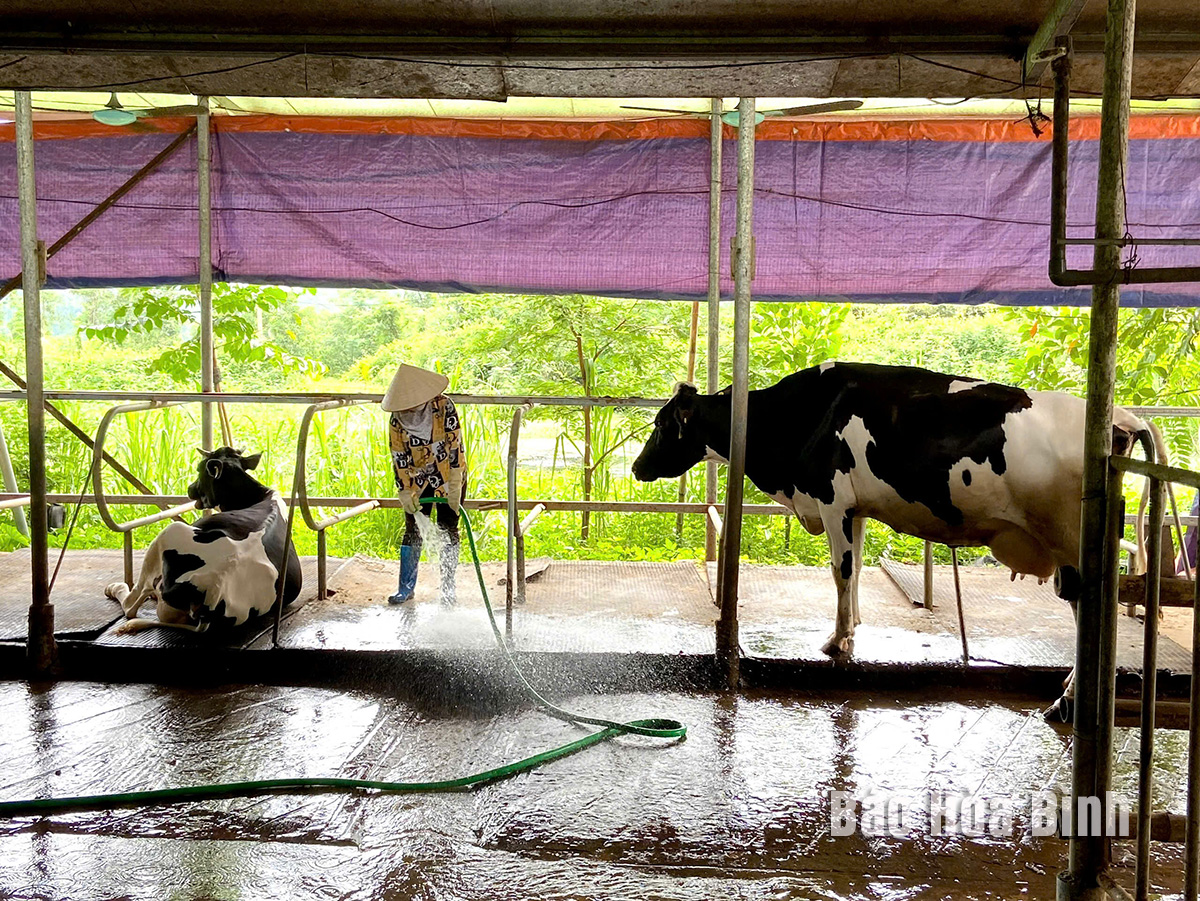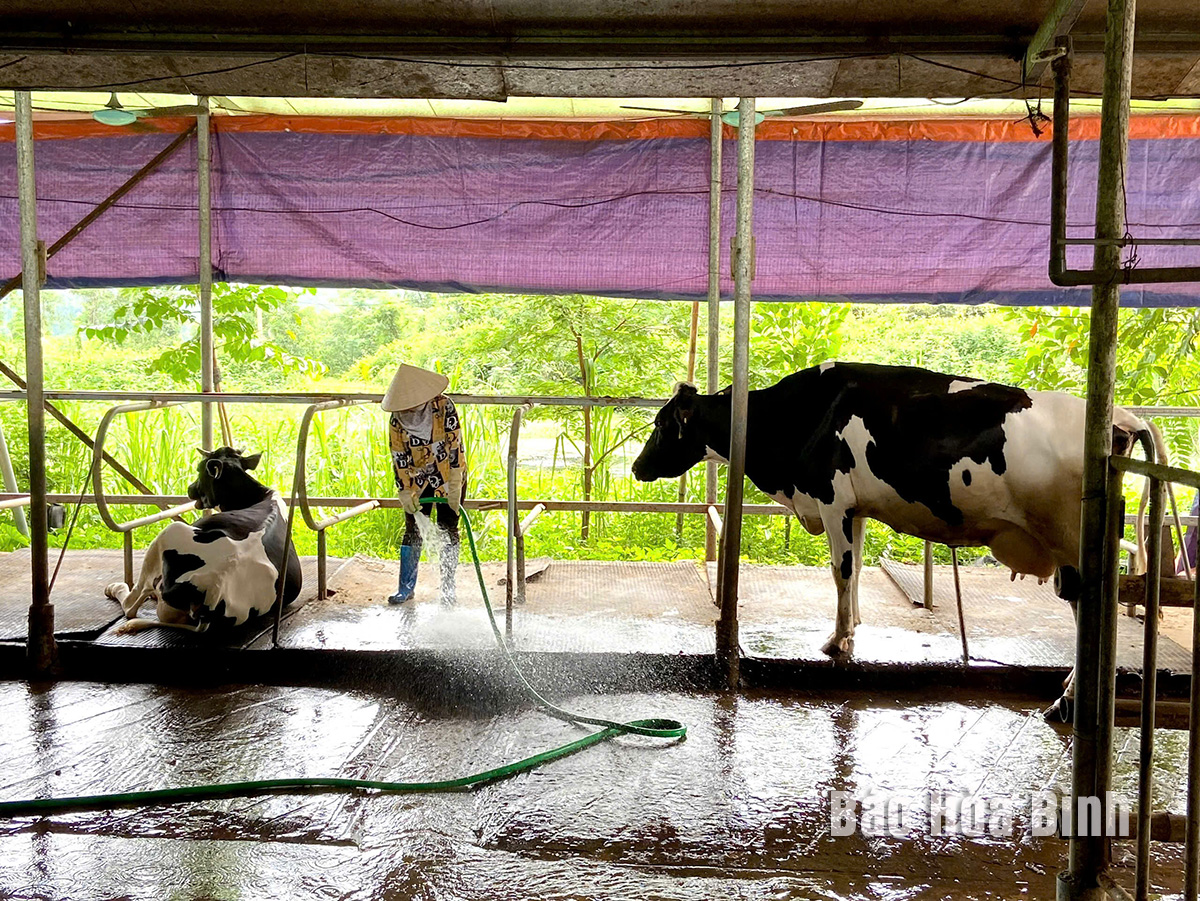
With a focus on cash crop farming with science - technology application and brand building, Lac Thuy district is gradually increasing production value, improving people's life quality, and laying the foundation for sustainable socio-economic development.
Farmers in Phu
Thanh commune, Lac Thuy district, have reaped high profits from dairy farming development.
Implementing Plan No. 03-DA/TU, issued by the
provincial Party Committee's Standing Board on September 9, 2021, on developing
agriculture and promoting sale in association with building new-style rural
areas during 2021–2025, Lac Thuy has rolled out numerous measures. These
include reviewing and building specific plans, issuing action programmes suited
to local conditions, mobilising investment resources effectively, and
encouraging people and businesses to engage in modern agricultural production.
Lac Thuy is also taking the lead in developing
products under the One Commune, One Product (OCOP) programme. The district
currently boasts 23 OCOP products certified by provincial authorities,
including two with five-star national ratings. These products have not only
reached food safety standards but also secured VietGAP and production unit
certificates, meeting increasingly high market demand. In 2024, about 90% of
the district's key agricultural products are distributed through supermarket
chains and wholesale markets in Hanoi and other major localities.
Alongside production, the district has expanded
sale channels through e-commerce. Between 2021 and 2023, sales via the
Postmart.vn platform reached around 1.6 billion VND, primarily from chicken egg,
honeydew melon, bamboo shoot kimchi, and Dong Bong custard apple. Digital
technology is helping local farmers expand their market reach and gradually
adopt modern business methods.
As new-style rural area development remains a
central and ongoing task for Lac Thuy, the district has effectively mobilised
resources to upgrade rural infrastructure and improve the quality of life.
Investment has been prioritised for transport, irrigation, electricity,
educational, and cultural facilities. About 86% of agricultural land now has
access to irrigation, helping boost productivity.
Agricultural mechanisation is increasing,
especially in land preparation and harvesting, while attention has also been
paid to technology transfer and rural workforce training. From 2021 to 2024, 88
technical training courses were held with over 3,600 farmer participants, and
more than 1,000 rural labourers received vocational training. This has led to a
rise in skilled labour and helped create approximately 3,800 new jobs, thereby
increasing income and reducing the poverty rate.
As of 2024, Lac Thuy’s average income per
hectare of cultivated land reached 206 million VND (nearly 8,000 USD), a
1.25-fold increase from 2021. This reflects the district’s successful shift
from traditional to large-scaled commercial farming, with widespread adoption
of advanced techniques and new crop varieties.
The local agricultural structure has shifted
toward better balance and efficiency, with crop cultivation accounting for
nearly 50%, livestock farming about 28%, and the remainder forestry and
aquaculture. High-value specialised farming zones have taken shape, such as
safe vegetable areas, Song Boi tea plantations, and fruit orchards (custard
apple, longan, dragon fruit, macadamia). Signature products like Lac Thuy
chicken, Lac Thuy goat, Song Boi tea, and Dong Bong custard apple have gained a
foothold in the market both within and outside the province.
Vice Chairwoman of the district People’s
Committee Hoang Thi Thu Hang stated that Lac Thuy has fulfilled 13 out of 14
targets set in Plan No. 03-DA/TU. This achievement reflects the determination
and efforts by the entire political system and local people.
These results not only provide a strong
foundation for socio-economic development but also transform the rural
landscape towards modernity and sustainability. Moving forward, the district
will continue mobilising resources and accelerating digital transformation in
agriculture, aiming at a smart, sustainable, and high-value agricultural
sector, she added.
According to data from the Hoa Binh Provincial Party Committee, the industrial production index for the first six months of 2025 is estimated to have increased by 20% compared to the same period last year. This marks the highest year-on-year growth rate for this period since 2020.
In the first six months of 2025, Hoa Binh province’s export turnover was estimated at 1.145 billion USD, marking an 18.11% increase compared to the same period in 2024. Import turnover was estimated at $ 804 million, a 17.15% increase, which helped the province maintain a positive trade balance.
The lives of the ethnic minority farmers in Tan Lac district have gradually improved thanks to the new directions in agricultural production. This is a testament to the collective strength fostered through the professional associations and groups implemented by various levels of the district’s Farmers’ Union.
With the motto the "product quality comes first,” after nearly one year of establishment and operation, Muong village’s Clean Food Agricultural and Commercial Cooperative, located in Cau Hamlet, Hung Son Commune (Kim Boi district), has launched reputable, high-quality agricultural products to the market that are well-received by consumers. The products such as Muong village’s pork sausage, salt-cured chicken, and salt-cured pork hocks have gradually carved out a place in the market and they are on the path to obtaining the OCOP certification.
In the past, the phrase "bumper harvest, rock-bottom prices" was a familiar refrain for Vietnamese farmers engaged in fragmented, small-scale agriculture. But today, a new spirit is emerging across rural areas of Hoa Binh province - one of collaboration, organisation, and collective economic models that provide a stable foundation for production.
Maintaining growing area codes and packing facility codes in accordance with regulations is a mandatory requirement for agricultural products to be eligible for export. Recently, the Department of Agriculture and Environment of Hoa Binh province has intensified technical supervision of designated farming areas and packing facilities to safeguard the "green passport" that enables its products to access international markets.



